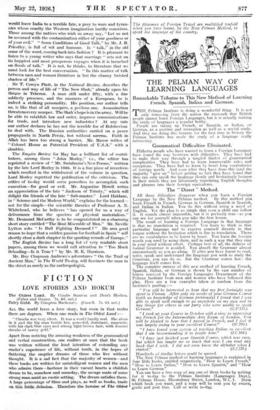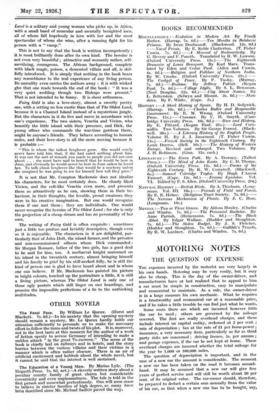FICTION
LOVE STORIES AND HOKUM
The Oldest Land. By Co-ralie Stanton and Heath Hosken. (Faber and Gwyer. is. 6d. net.)
Fairy Gold. By Compton Mackenzie. (Cassell. 7s. 6d. net.)
Au. the world loves a love story, but even in that realm there are degrees. When one reads in The Oldest Land " Claudia was very. silent. It was a world hardly real. She alone in it and the big man beside her, powerful, dominant, magnetic, with his dark-blue eyes and strong light-brown hair, with leonine streaks of tawny gold."
Apart from noticing the amazing weakness of the grammatical and verbal construction, one realizes at once that the book was written without the least intention of extending any reader's experience of life, without truth, in • the hopes of flattering the emptier dreams of those who live without thought. It is a sad fact that the majority of women—and these books are written for unintelligent women and the men who admire them—harbour in their vacant hearts a childish dream to be, somehow and someday, the savage mate of some strong man amid an exotic setting. The dream satisfies them.. A large percentage of films and plays, as well as books, trade oa. this futile...delusion- Therefore the heroine of -The Oldest•
Land is a solitary and young woman who picks up, in Africa, with a small band of muscular and mentally benighted ;nen, all of whom fall hopelessly in love with her and the most spectacular of whom she wins, after a running fight for his person with a " vamp." - - This is not to say that the book is written incompetently ; it is most brilliantly done after its own kind. The heroine is not even very beautiful ; attractive and womanly rather, self- sacrificing, courageous. The African background, complete with black magic, poison, a demented villain and all, is skil- fully introduced. It is simply that nothing in the book bears any resemblance to the real experience of any living person. Its unreality even carries the authors away : it is with wicked
glee that one reads towards the end of the book : " It was a very quiet wedding though two Bishops were present." That is not intended to be funny. It is sheer artlessness.
Fairy Gold is also a love-story, almost a sweetly pretty one, with a setting no less exotic than that of The Oldest Land, because it is a Channel Island instead of a mysterious jungle. But the characters in it do live and move in accordance with one's experience. The two sisters, Venetia and Vivien, who beautify the little island with their presence, and Dick, the young officer who commands the war-time garrison there, might be anyone's friends. They behave according to human codes, and their love-story is all the more moving because it is probable :-
" This is where the tallest foxgloves grow. She would surely never have told him that, if she had cared nothing about him. It was not the sort of remark you made to people you did not care about . . . she must have ss,id to herself that he would be here in June, and obviously he would never be here in June unless he loved 'her. To talk about foxgloves like that would be a mockery unless .she imagined he was going to see for himself how tall they grew."
It is not that Mr. Compton Mackenzie does not idealize -his characters, for he most certainly does. He clearly liked Vivien, and the colt-hike Venetia even more, and presents them as attractively as he can, showing them in their be- haviour, in their thoughts, the lovable, proud creatures they were to his creative imagination. But one would recognize them if one met them ; they are individuals. One would never recognize the heroine of The Oldest Land ; for she is only the projection of a cheap dream and has no personality of her own.
The writing of Fairy Gold is often exquisite : sometimes just a little too profuse and lavishly descriptive, though even so it is enjoyable. The characters in it are delightful, par- ticularly that of John Holt, the island farmer, and the privates and non-commissioned ' officers whom Dick commanded :
Sir Morgan Romare, father of the two girls, has a good deal to be said for him, too. A mediaeval knight marooned on his island in the twentieth century, almost bringing himself and his family to grief by his stiff-necked folly, he is still the
kind of person one is glad to have heard about and in whom one can believe. If Mr. Mackenzie has painted his picture in bright colours, touched up the portraiture a little, it is still a living picture, whereas The Oldest Land is only one of
those ugly posters which still linger on our hoardings, and promise the impossible perfections of a lie to the unthinking
multitudes.















































 Previous page
Previous page